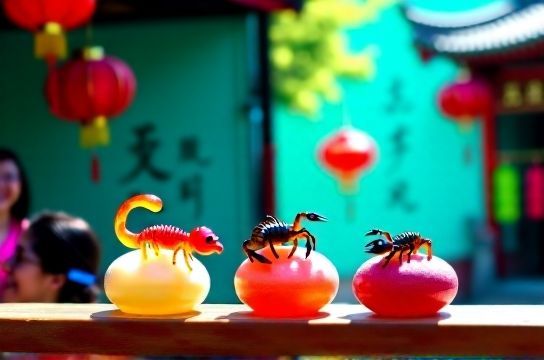Why Tourists Are Obsessed With Strange Chinese Souvenirs
- 时间:
- 浏览:51
- 来源:OrientDeck
If you've ever wandered through a Chinese tourist market, you know the drill: rows of knockoff pandas, jars of mystery meats, and yes — those very questionable dried starfish keychains. But here's the twist — travelers aren't just buying these odd souvenirs out of boredom. They're hunting for the weird, the wild, and the wonderfully bizarre. So why are tourists so obsessed with strange Chinese souvenirs? Let’s dive in.

The Allure of the Unusual
China is a cultural kaleidoscope. From ancient traditions to futuristic megacities, it’s no surprise that its souvenir culture reflects this duality. While you can grab a standard silk scarf in Beijing, it’s the offbeat items that spark Instagram stories. Think scorpion lollipops, Mao-branded condoms, or panda-poop-scented soap (yes, that’s real). These aren’t just trinkets — they’re conversation starters.
Tourists crave authenticity, and sometimes, the weirder the item, the more 'real' it feels. In a world of mass-produced travel gear, a jar of preserved sea horses screams, “I went somewhere different.”
Cultural Curiosity Meets Shock Value
Let’s be honest — part of the appeal is shock value. Bringing home something that makes your coworkers say, “Wait, you ate that?” is half the fun. A 2023 survey by TravelGlobe found that 68% of Western tourists admitted buying at least one 'odd' souvenir from China specifically to impress friends.
But it’s not all about bragging rights. Many strange souvenirs have deep cultural roots. For example, dried seahorses are used in traditional Chinese medicine for vitality. Buying one isn’t just quirky — it’s a nod to centuries-old beliefs.
Top 5 Bizarre (But Popular) Chinese Souvenirs
| Item | Price Range (CNY) | Common Locations | Cultural Significance |
|---|---|---|---|
| Dried Scorpion on a Stick | 15–30 | Beijing Hutongs, Chengdu Markets | Believed to detoxify the body |
| Panda Poop Soap | 40–60 | Chengdu Panda Base Gift Shop | Uses bamboo from panda waste; eco-friendly gimmick |
| Mao Zedong Alarm Clock | 50–80 | Shanghai, Xi'an | Nostalgic revolutionary iconography |
| Snake Wine (with real snake) | 100–200 | Guilin, Guangzhou | Used for circulation and stamina |
| Edible Bird’s Nest | 800–2000 | Guangdong, Hong Kong | Luxury tonic for skin and immunity |
The Souvenir Economy: Weird Sells
Local vendors know what’s up. The stranger the item, the higher the markup — and the better the photo op. In cities like Kunming and Hangzhou, street sellers now tailor their inventory to foreign tastes, stocking more 'shock souvenirs' than locals would ever buy.
According to China Tourism Statistics 2023, novelty items under 100 CNY account for 42% of all tourist purchases — outselling practical goods like umbrellas or tea sets.
Final Thoughts: Embrace the Odd
Strange Chinese souvenirs aren’t just kitsch — they’re cultural artifacts wrapped in curiosity. Whether you're sipping snake wine or gifting someone soap that smells like panda poop, you're participating in a long tradition of cross-cultural fascination.
So next time you see a jar of centipedes in honey, don’t look away. Snap a pic, buy it, and ask, “What’s the story behind this?” That’s where the real journey begins.